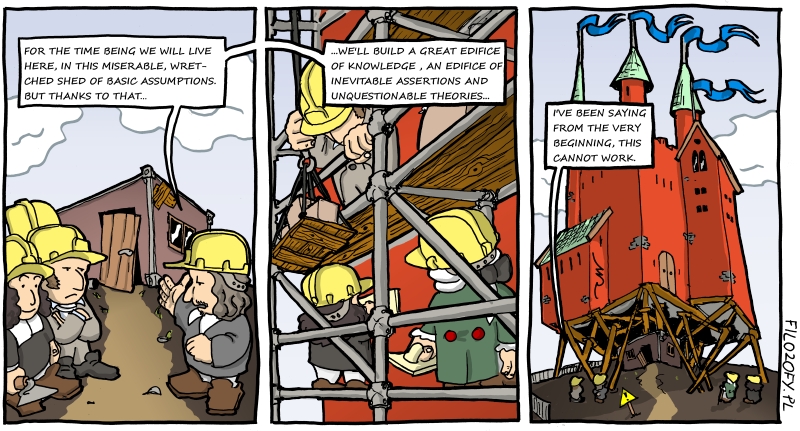C. (BB.) Spirit: VI. Spirit: C. Spirit that is certain of
itself. Morality (364-409)
Wednesday, 22 April 2015 (notes by Marton Ribary)
Only the movement is real:
Hegel’s dialectical method has demonstrated that whatever is
treated as stable will necessarily destabilise itself by having been contrasted
with its opposite. The dialectical movement of reflection allows no room for
the so-called “eternal truth” that philosophy has been chasing for too long. Inasmuch
as thought is treated as a single, solid and stable piece of knowledge, it
becomes immediately fragile to challenges. Only the movement is real, and
therefore only the constant progress from one form to another can hold the claim
to be true.
The reality of thoughts:
Consequently, contrary to the long-standing philosophical dogma,
inasmuch as a thought is true, it must be real, inasmuch it is real, it must be
moving and alive. They are not the eternal Platonic entities that mortal humans
occasionally take part of when they have reached an advanced level of
philosophical reflection. The age old contradistinction between mortal humans
and immortal thoughts is a mistake – mortals do not borrow immortal ideas when
they think. What I think here and now is not the same what Plato thought 2400
years ago. In short, there is no such thing as philosophia perennis (and
thereby a good part of contemporary analytic philosophy is following a
dead-end.) Just as humans are born, live and die, thoughts are living entities too.
The empty nature of morality:
In the previous section, Hegel has demonstrated with strong
allusions to the French Revolution that absolute freedom is empty and eventually
devours itself. He moves on to discuss whether morality can be used as a
reference point for our conduct, and concludes that all externally set rules
are empty and meaningless. Set rules destabilise themselves because what is
treated as solid and unchanged falls victim to dialectical reflection. Moral standards
set by another consciousness (God, society, the perfect law-giver, Kant’s
formal rules etc.) turn out to be empty and meaningless, because they are dead
and do not move forward, and because they are outside the consciousness (the “I”)
who is supposed to follow them.
The acting conscience:
Internalised, dynamic and self-constituted standards seem to be
the solution for the problem of human conduct. In what Hegel calls “duty”,
conscience serves as the force of human action. Just as set standards turn into
their opposite by dialectical reflection, abstaining from action and thereby
creating a moral zero is similarly static and self-destroying. The “beautiful
soul’s” solution to the moral conundrum of action eventually leads nowhere. By
overcoming the self-destroying character of static standards of conduct, acting
conscience (that is, duty) is capable of moving towards self-realisation
without turning into its opposite and eliminating itself in the process. The key
is that self-realisation is not achieved by reaching a set target or by living
a perfectly moral life, but by being recognised by another consciousness. The
acting conscience realises itself by being recognised by another.


No comments:
Post a Comment